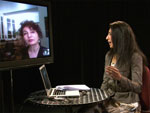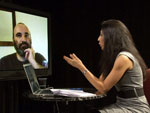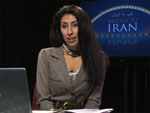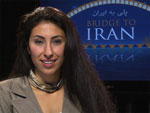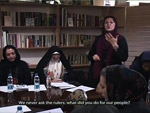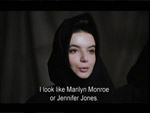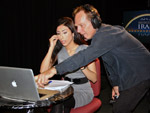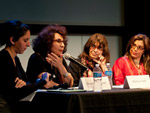BLOGTALKRADIO: TELEVISED – February 13, 2012
Internet radio program covering the TV scene, live from HBO headquarters in New York. Our guests: “Everybody Loves Raymond” creator Phil Rosenthal, whose new documentary Exporting Raymond debuts Thursday night on HBO, and Stephen Olsson and Persheng Vaziri, co-producers of “Bridge To Iran” on Link TV. (follows the interview with Phil Rosenthal, creator of the TV series “Everybody Loves Raymond”)
Listen here:
Read the transcript:
Host: Simon Applebaum
SO: Stephen Olsson
PV: Persheng Vaziri
00:33:15.03 [START]
Simon Applebaum (host): By now you may know that there is a lot of buzz about what may or may not happen in the next few months between Israel and Iran, which of course, is rumored to be building nuclear weapons. And Israel is, of course, being rumored to be perhaps planning a strike back. Against that backdrop, Link TV, the global and award-winning media news network is launching the season of a series that’s been running from 2007. It’s called “Bridge to Iran” and its latest season premiers tomorrow night. Joining us now from San Francisco, co-producer/director, Stephen Olsson. Stephen, welcome to the program!
Stephen: Hi, glad to be here Simon.
Simon: And here in New York, the other producer/director of the series, Persheng Vaziri. Persheng, good to have you on board.
Persheng: Thank you. Hello to everyone.
Simon: Persheng, starting with you. What do you make of the timing of the new series given what is happening or what may be happening in Israel and Iran?
PV: Yes, this is a very sensitive time, so it is great that we are having this film series that focuses on ordinary people, and not on over-blown political issues.
Simon: And Stephen, what’s the biggest thing about Iran and its people and its government and its culture that we ought to know more about and we don’t?
SO: Well, it’s an amazing place, and after your previous guest
(producer of “Everybody Loves Raymond”) we might consider calling the series “Everybody Loves Iran.” Well, everybody DOESN’T love Iran, but they might love Iran if they knew the real Iran — which is an amazing society and amazing culture of real thinking people, artists, scientists — quite often people who have a lot of affinity for the United States. I don’t think most Americans know that. We have connections to Iran that we don’t even realize!
Simon: And why don’t we realize that, Persheng?
PV: Well, unfortunately because these political issues take the forefront in the media and usually when we don’t know much about a small country, very far away from the US, we only think of it in terms of what the media puts out. But there’s a lot else going on, and we see that in the films from Iran, which are usually very critically acclaimed and poetic — and say a lot about human nature and universal truths about human beings all over the world.
Simon: Stephen, the idea behind “Bridge to Iran” — this will be the sixth season, it started in 2007 — is to give Iranian filmmakers a chance to be seen in the United States, with their work. Who came up with the idea of pulling this off?
SO: Well, this started as part of a programming initiative at Link TV where Link was involved in purchasing films that were actually made in Iran — to give people in the US a window into the life and culture there. It is not that frequently in the American television landscape can Americans actually see something coming from an Iranian perspective. So this was realized back in 2006, and from that programming initiative we gradually developed a weekly television series that presented such films.
Now we’re taking that to the next level with a bilingual program with live-to-tape interviews with the filmmaker themselves, very much creating a film festival-like experience. We have the filmmaker there, they tell you why this issue is important to them. You see the work, feature length work, sometimes unusual lengths for television, like 95 min or 81 min, whatever the film was made at originally, and then you have an in-depth interview with the filmmaker. Unlike a film festival, like Tribeca, where a translator is trying to convey what the director is thinking and feeling to the audience, here we have subtitles (of the filmmaker interview), so Americans can actually experience the emotions of the filmmaker in real time and understand what the filmmaker is saying.
We are basically trying to make a connection with a part of the world that has not only been ignored, but in some cases, deliberately ignored. Because on some levels it is easier to attack the ‘other’ when you don’t understand the ‘other.’ If you understand the ‘other’ as a human being, or as a viable culture and society, it is very hard to succumb to simplistic accusations, like those that are flying around on commercial television and other places these days.
Simon: (station promo…) Stephen Olsson and Persheng Vaziri are the producer/directors of “Bridge to Iran” starting its latest season tomorrow night on Link TV, 7.30pm Eastern/Pacific time, and they are joining us live – we have an East/West connection going here. Stephen from San Francisco and Persheng here in New York.
Persheng, very interesting, your first episode, in fact, deals with filmmaking; it’s called “A Cinematographic Revolution.” It deals with the history and politics of Iran through films.
PV: Yes, that’s premiering tomorrow and we feel that this is a good way to start the series because it gives us a framework into the films that come out of Iran and their history. As you know “The Separation” is nominated for an Academy Awards this year, so “A Cinematographic Revolution” gives a rich history of what has led up to this point where films from Iran get nominated for Academy Awards. So that’s an overview, and then we continue with “Queen and I”, which is about the former queen of Iran and her relationship with the filmmaker, who is a leftist filmmaker, and talking about the situation in Iran and the personal lives of women who are forced to live in exile outside of Iran.
Another film that we are showing is called “We Are Half of Iran’s Population.” It’s about the recent presidential election in Iran, which was controversial, and the role of women in those elections. Many people don’t understand that women are very active in Iran and in the cultural and political life of Iran. You get an idea of how that is, through this film, which is by a very good Iranian filmmaker. “Joymakers” is the final film of the series, which premiers on March 8th, and that traces a popular form of theatre in Iran which is not given enough credit anymore, but used to be very popular in the old days, and you kind of get an insight into working-class Iranians’ taste in theatre and what is important to them.
Simon: Stephen, how many films did you and Persheng look at before making the call as to these final four getting on the air?
SO: Let’s see, I think Persheng herself gathered about 100 films for consideration and then she passed on to my colleague Lorraine Hess and I, and with Persheng, we viewed about 40 to 50 together. From those, we selected these four, in part, I think — again, echoing back to something from the first part of your show when Phil Rosenthal talked about the “timeless quality” of “The Honeymooners” and so on — we are also interested in the timeless story, the universal story, which also tells a larger story and transcends cultural barriers. So, you know, things can change on the ground in Iran in a week or in a month and of course, that’s the domain of current affairs, news. What we’re trying to do is select stories that take people deeper into the lives of Iranians, into the society, explore some of the complexities of living in Iran, so that viewers come away feeling that they really understand something that they didn’t understand before.
Simon: Persheng, is this the first time that you and Stephen have worked together on a project?
PV: No, we worked on the previous “Bridge to Iran” series together, but that was more simply constructed. We had some interviews with the filmmakers of the series, but this time around, we’ve really made it look really very good, and with the subtitles and translations and the live host, the series can really communicate better with American audiences. So, this is the second season of the series with the filmmaker interviews.
Simon: And speaking of those filmmakers, Persheng, what do they tell you about the difficulties of capturing their subject on film inside that country? What are they dealing with?
PV: Well, first of all, there is always an issue of censorship, which is very difficult to overcome. But Iranian filmmakers are kind of experts in this area and the films, the first film, “A Cinematographic Revolution,” talks about this in quite some detail — about all the barriers to making films, especially documentaries. However, there is always a way, because nothing is black and white in Iran and there are always grey areas where filmmakers have learned to tread, and they make their films. Another interesting point is that three of the films are made by Iranian women, so that also speaks to the fact that women are quite active as artists and as intellectuals in Iran.
Simon: Stephen Olsson and Persheng Vaziri, the show they work on is “Bridge to Iran”, it begins its new season tomorrow night, 7:30 pm Eastern/PST on Link Tv available, depending on your area, on cable and satellite, and they are our guests this half hour on “Tomorrow Will Be Televised.” Stephen from San Francisco, Persheng here in New York, on Blog Talk Radio. I’m Simon Applebaum and we are joining you live on “Tomorrow Will Be Televised Today” from the headquarters of Home Box Office, across the street from Bryant Park in New York, a block away from Times Square, and we invite you to be in the conversation. [show promo]
I wonder what you learned from each other — this is your second time around with the series. What do you learn from each other? Stephen, you are American. Persheng, Iranian American, what do you learn from each other about the subject from working together?
SO: I’m happy to answer that. I just want to let people know, though, that the series is streamed on the Internet and you mentioned Link TV, which is a satellite national broadcaster, but the series is streamed on our website for free. These four films are streaming for free and people can go and log on and watch them in high-definition video, starting this evening: LinkTV.org/BridgeToIran.
Working together with Persheng as a native Iranian, is fascinating, because it is very much about the insider/outsider model. And there are layers to that onion. Persheng and many of our filmmakers are deeply in touch with their own culture, with their own language, their own poetic tradition, which has spawned this incredible, cinematic volcano that’s coming from Iran.
At the same time, you know, as an Iran-lover, someone that’s been to Iran a few times in the last few years, somebody who’s made films in the Middle East, and making films traditionally for American audiences, I think I bring more of the outsider’s point of view, perhaps closer to our non-Iranian television audience. And so, it’s a really interesting mix. You try to go deeply within a story, deeply into an interview, and yet not go over the heads of our American audience, while really trying to do justice to our Iranian audience, who are looking for all the nuance that they can possibly find in these films.
Simon: Persheng, what do you learn from Stephen?
PV: Well, a great deal – he’s a very professional, great, award-winning television producer, for one thing. The look of this series is great. But, on the other hand, I wanted to also say that there’s also a wide Iranian-American population who is interested in the series and so, kind of, we’ve been learning from each other. Stephen has learned from the Iranian Americans here in the US and, for me, it is also important to realize which points are more important and more understandable for Americans to pay attention to. I think that perspective comes from the American point of view.
SO: At least a non-Iranian point of view, because I think 35% of Link TV’s viewers are not native-born Americans. So we’re talking about an audience that comes from Latin America, from the former Soviet Union, really from all over the world. So this insider-outsider perspective is really a fascinating thing and if you come and watch some of the films in the series from an Iranian exiles’ point of view, for example, the woman that made “The Queen and I”, she’s an Iranian Communist, living in Stockholm. Now, she is both an insider and an outsider. She’s living a chosen life in exile. The funny thing was that she was part of that socialist/Communist segment of community that helped bring down the Shah, but now, she’s been arrested and detained by the clergy and by the Iranian Revolutionary Government. So, she’s both an insider and an outsider and I would argue that we are all insiders and outsiders on some level.
Simon: Persheng, do any of these filmmakers express any optimism, that somehow, someway, Iran will transform and whatever they are dealing with, nuclear, will not come to pass and Israel, whatever you think of them as a country, will not strike? Or the possibility that we may have, like other countries in the Arab world an Arab Spring?
PV: Wow (laughs). You know, as a cultural and artistic kind of person, we are always hopeful and the filmmakers, I think, also, if I may speak for them — I’m not sure — there’s always hope. And that’s the purpose of the films and artistic productions – to bring people closer together and make them understand each other. I think that in Israel, there is a great love of Iranian cinema, as there is in the US also. And films in general are also a way for people to get to know each other, beyond the political craziness that is going on. So yes, of course, that’s why we work, that’s why we are doing what we are doing and we are hopeful, and let’s see if it’s the power of people, ordinary people, and artists that wins over the day, I hope. That’s what we hope for, yes.
Simon: You mentioned Phil Rosenthal earlier, our first guest this hour. Would he have a better chance making “Everybody Loves Raymond” or adapting it for Iran, as opposed to Russia?
PV: I think maybe Stephen can answer to that; I’m not sure.
SO: I think he’d have a better chance in Russia, under the present political climate!
Simon: What about the television in Iran? By the way, do both of you monitor what goes on with Iranian television? What is it like? We rarely see it. I’m just wondering what is it like and how restrictive is it?
PV: Well, Iranian television is basically state television, so it is definitely controlled by the Iranian government; it is not private. So it’s not really that accessible to American viewers, but Iranian Americans can view it via Internet. There is also Press TV that is in English and can be viewed. Of course, they present the Iranian point of view, and if you want to understand the Iranian point of view, it might be a place to go to – meaning the Iranian government’s point of view. But in terms of what Iranian people are really thinking, I would say that the films that come out are much better expression of that than the television.
Simon: And what about the host of the show, which we haven’t talked about yet. What’s she like and how did you pick her to do these episodes?
SO: Parisa Soultani is the program host. She’s born in Tabriz, Iran, and has been in the United States for about five or six years. We chose her, in part, because she did, and is doing, such an incredible job on another project, a web-based series called OneThroughLove.org. She’s multi-lingual, she’s very bright, very engaging and basically has screen energy and the filmmakers clearly enjoy the conversation. I think that she has been in the States long enough to understand the ‘non-Iranian’ point of view in the questions and anyway, as a producer/director, I would say, it’s that which is called TV Q- the screen lights up!
Simon: Before we go, Stephen and Persheng, it’s interesting that Link TV is operating at a very exciting time, in terms of an explosion of international programming. You have BBC, with their world news, trying to get on cable systems in the United States, Aljazeera English, there’s Russia Today, RT, which is now on cable systems here. And there was news last week that China Central Television, which has an English language newsfeed on some cable and satellite systems here, is now launching a block of Washington-based news programs. What do you think about this explosion of international news in English and a growing number of cable and satellite places where you can find it?
SO: Well, Link TV, from the beginning, was dedicated to presenting news reports from foreign sources. So with so many things, I think Link TV was about ten years ahead of the curve. We produce a program called Mosaic, which presents news from the Middle East, which won a Peabody award in the mid-90s because it presented points of view from throughout the Middle East, to let people know that there is not one Arab point of view, there are dozens of Arab points of view. So now, when we watch Al Jazeera in English, or Press TV, which is the Iranian government counterpoint to Al Jazeera or RT, Russian international news, it’s a much more sophisticated news environment. Perspectives are a bit more obvious, perhaps, than American corporate news, I would say, but Link has been committed to this from the very beginning and I would suggest to your viewers, if they haven’t already, to look at the Link TV website and look at our daily Mosaic broadcast from the Middle East, presenting Israeli broadcasting, alongside of Egyptian, Syrian, Iranian – it’s a rich mix.
Simon: As an award-winning program, it’s won a Peabody award, other major journalism awards over the years, it’s an excellent show.
SO: That’s right, it’s an excellent show and a unique show and, by the way, Link TV received communications from Washington, when it went off the air for 10 days, from the White House, saying, “What happened to Mosaic? We’ve been relying on Mosaic every day.” So, it’s a very unusual half-hour of news programs, but very insightful.
Simon: “Bridge to Iran” is very insightful as well, and the season premiere of this series is tomorrow night, 7:30 pm Eastern/Pacific Time on Link TV, the global media news network. Check your local listings for where it is available in your area. For more details about the program or if Link is not available in your area and you want to see it streamed online, here’s where you go: www.linktv.org/BridgeToIran. Stephen Olsson, Persheng Vaziri, the co-producer/directors of Bridge to Iran. Thank you again for joining us from San Francisco and New York respectively. Pleasure to have you on, good luck with the season premiere on tomorrow night, and all the very best for a great run.
SO: Thank you, Simon.
PV: Thank you very much.
Simon: Take care.
00:57:24.29 [END]

